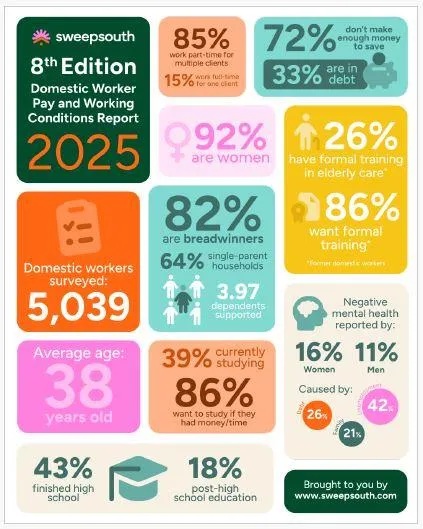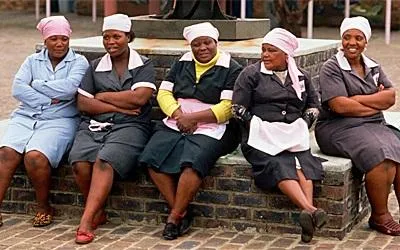SA's domestic workers: 39% earn below minimum wage

Domestic workers are ambitious and most would like to be able to study further.
Image: Supplied
The plight of domestic workers in South Africa remains dire, with the recently released Annual Report on Domestic Worker Pay and Working Conditions from Sweepsouth revealing that a staggering 39% earn below the national minimum wage.
The report, which surveyed 5 039 domestic workers across the nation, found that the median monthly earnings stand at R3 635 - well below the R4 500 deemed necessary for basic living expenses.
This report paints a grim picture of the economic pressures confronting an essential workforce that forms the backbone of many households in South Africa, yet struggles to meet their basic needs. As rising costs of housing, food, and transport outstrip wages, the gap between income and the real cost of living widens. This reality results in a pervasive cycle of debt, hardship, and insecurity for thousands of workers and their families, a crisis that has only intensified in light of global economic turbulence.
Harsh reality behind the numbers
Domestic workers, who account for a significant portion of the country’s workforce, face an increasingly precarious existence. The findings show that 82% of these workers are the primary earners in their households, with over half supporting four or more dependents. Despite holding full-time jobs, many of these households cannot meet even the most basic needs, often forcing them to rely on debt to make ends meet.
In the past year, essential costs have increased sharply - housing costs rose by 11% and food prices by 8%. Consequently, the average domestic worker now faces a monthly shortfall of nearly R900 between their income and essential expenses, leaving them with no room for savings or emergency funds. Families frequently find themselves making agonising decisions about basic necessities such as food, rent, and education.
Key findings from the 2025 report
- 82% are the main earners in their households
- 58% support four or more dependents
- 39% earn below the National Minimum Wage
- Median earnings are R3 635 per month against R4 500 basic cost basket
- 86% want to further their education
- 33% are in debt, with 35% of those describing repayment as hopeless
- 20% have experienced workplace abuse
- 16% report declining mental health
“These findings paint a stark picture of economic vulnerability. Even those working full-time, sometimes seven days a week, are trapped in a deficit between income and basic survival costs,” said Lourandi Kriel, CEO of Sweepsouth. “Unless we address wage gaps, abuse, and barriers to skills growth, this cycle of hardship will continue to repeat itself.”

More and more domestic workers are falling into debt because their pay doesn't even reflect the government's minimum wage.
Image: File
Beyond pay: Hidden stories
The report delves deeper than mere financial statistics, revealing the often-overlooked lived realities of domestic workers. Many spend over an hour commuting each way to their jobs, impacting both their earnings and valuable family time. Furthermore, the isolation that comes with domestic work - often spent in private households with limited social interaction - contributes to feelings of loneliness and invisibility.
Moreover, domestic workers frequently juggle unpaid responsibilities at home, such as caring for elderly relatives. As the nation’s population ages, there is a rising interest among workers in transitioning to elderly care roles that promise increased stability and income. Yet, despite their significant contributions, very few are registered with the Unemployment Insurance Fund (UIF) as complex processes deter compliance.
Debt, stress, and mental health
Debt has emerged as a pervasive issue, with one in three domestic workers in debt, often relying on informal lenders with exorbitant interest rates. Among those in debt, over a third perceive their repayment chances as hopeless, creating a cycle of stress and anxiety.
This financial strain has visible consequences; 16% of respondents indicated a deterioration in their mental health over the past year - a number linked quite directly to economic pressures and experiences of workplace instability or abuse.
Many desire support for mental health resources, saying they would seek help if affordable services were available.
Resilience, ambition, and untapped potential
Remarkably, despite these adversities, domestic workers continue to exhibit resilience and ambition. The report reveals that 86% aspire to further their education or acquire new skills, viewing domestic work as a stepping stone towards better opportunities. Common aspirations include careers in childcare, nursing, hospitality, and entrepreneurship.
Sweepsouth suggests that targeted support and training could unlock this potential, enhancing not only the lives of individuals, but also providing a boost to South Africa’s economy. Investing in the aspirations of this workforce could yield dividends, fostering community strength and economic security.
A call to action
The findings of the 2025 report culminate in a clarion call to employers, policymakers, and society at large.
Sweepsouth advocates for:
- Payment of a living wage that reflects the actual cost of living, not merely the legal minimum.
- Fair working hours, leave entitlements, and safe work conditions to uphold the dignity of workers.
- Support for educational and training opportunities that facilitate career mobility and self-sufficiency.
- A zero-tolerance policy for workplace abuse, alongside systems for accountability.
- Recognition of domestic workers in economic planning, particularly during times of broader economic disruption.
Kriel says that domestic workers are essential to South Africa’s social and economic fabric. “By investing in their wellbeing and growth, we are not only supporting one of the most vulnerable groups in society, but also cultivating stronger families and communities, along with a resilient workforce that can withstand external pressures.”